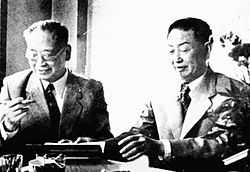Ouyang Yuqian
| Ouyang Yuqian | |
|---|---|
|
Ouyang Yuqian | |
| Native name | 欧阳予倩 |
| Born |
Ouyang Liyuan May 12, 1889 Liuyang County, Hunan, Qing Empire |
| Died |
September 21, 1962 (aged 73) Beijing, People's Republic of China |
| Pen name |
Chunliu Taohua Buyi'an Zhuren |
| Occupation | Dramatist, educator, film director |
| Language | Chinese |
| Nationality | Chinese |
| Alma mater |
Meiji University Waseda University |
| Period | 1922-1962 |
| Genre | Stage play, Peking Opera |
| Notable works | A Wandering Songstress |
| Spouse | Liu Yunqiu |
| Relatives |
Ouyang Zhonghu (grandfather) Ouyang Ziyun (father) Liu Yixia (mother) |
Ouyang Yuqian (simplified Chinese: 欧阳予倩; traditional Chinese: 歐陽予倩; pinyin: Ōuyáng Yǔqiàn; May 12, 1889 – September 21, 1962) was a Chinese dramatist, educator, and film director.
Ouyang Yuqian was President of Central Academy of Drama from 1950 to 1962, until his death. He was a member of the Communist Party of China. He was the 2nd and 3rd Vice-Chairman of the China Federation of Literary and Art Circles, 1st and 2nd Vice-Chairman of the China Theater Association, and 1st and 2nd Chairman of the Chinese Dancers Associaton. He was a member of the 1st National Committee of the Chinese People's Political Consultative Conference and the 1st and 2nd National People's Congress.[1][2]
Names
His art name was Nanjie (南杰), Lanrong (兰容) and Liansheng (莲笙), his pen name was Chunliu (春柳) and Taohua Buyi'an Zhuren (桃花不疑庵主).
Biography
Ouyang Yuqian born into a wealthy and highly educated family, in Liuyang County, Hunan, to Ouyang Ziyun (Chinese: 欧阳自耘), and Liu Yixia (Chinese: 刘倚霞), on May 12, 1889. His birth name was Ouyang Liyuan (欧阳立袁). Both his grandfather Ouyang Zhonghu (Chinese: 欧阳中鹄), and maternal grandfather Liu Renxi (Chinese: 刘人熙), were officials in the Qing government. He secondary study at Chengcheng High School, at Shinjuku of Tokyo, in Japan. Then he graduated from Meiji University and Waseda University.[3] He studied Peking Opera since 1906.
He returned to China in 1911 and founded Xinju Comrade Society (新剧同志会) with Lu Jingruo. He also founded Gengsu Theater (更俗剧场) in 1906. He joined the Drama Society (戏剧协社) in 1922.

He established Guangxi Provincial Art Museum in 1940. After the Second Sino-Japanese War, he moved to Shanghai, and served as the playwright-director of New China Drama Society (新中国剧社). In January 1947, he led a delegation to Taiwan to perform. While the 228 Incident broken out, he left Taiwan and returned to Shanghai, then taught at Shanghai Experimental School of Drama. Ouyang Yuqian worked as the playwright-director of Yonghua Film Company, in British Hong Kong, during the Chinese Communist Revolution.
In March 1949, he was invited by the Central Committee of the Communist Party of China to attend the 1st Chinese People's Political Consultative Conference. He was elected director of the Chinese National Opera Improvement Committee and a Standing Committee member of the China Federation of Literary and Art Circles.
Ouyang Yuqian became President of Central Academy of Drama in April 1950. He joined the Communist Party of China in 1955. He was the 2nd and 3rd Vice-Chairman of the China Federation of Literary and Art Circles, 1st and 2nd Vice-Chairman of the China Theater Association, and 1st and 2nd Chairman of the Chinese Dancers Associaton. He was a member of the 1st National Committee of the Chinese People's Political Consultative Conference and the 1st and 2nd National People's Congress.
On September 21, 1962, he died of illness in Beijing.
Personal life

Ouyang Yuqian married Liu Yunqiu (Chinese: 刘韵秋), daughter of Qing government's official Liu Renxi (Chinese: 刘人熙), the couple had a son, Ouyang Shanzun (Chinese: 欧阳山尊; 24 May 1914 – 2 July 2009), was also a dramatist.
References
- ↑ 电影艺术家欧阳予倩逝世,历史上的今天, 2013-04-07, Chinese.
- ↑ Ouyang Yuqian (1889—1962), Ministry of Culture of the People's Republic of China, 2009-04-29, Chinese.
- ↑ 大匠开风气 后生常仰慕——访欧阳予倩故居. People.com (in Chinese). 2006-08-18.
External links
| Educational offices | ||
|---|---|---|
| Previous: Position established |
President of Central Academy of Drama 1950-1962 |
Next: Cao Yu |
